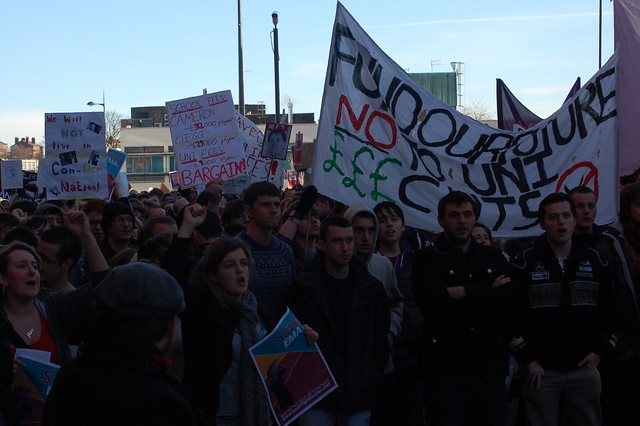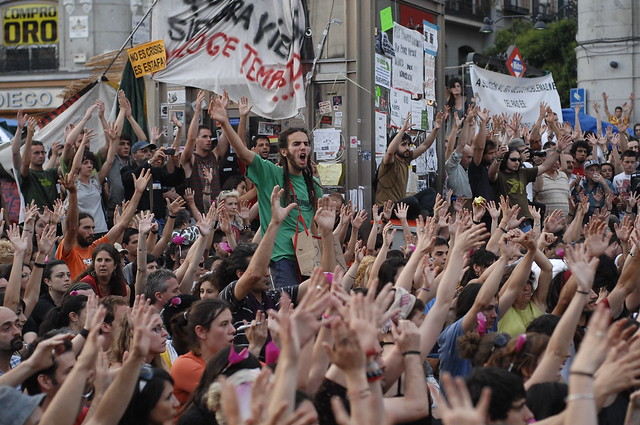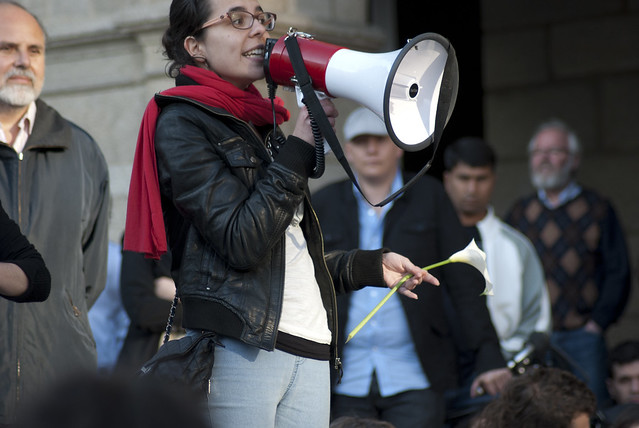Since the beginning of spring (the Northern hemisphere one) I’ve had the feeling this year’s pack of protests, revolutions and all sorts of demonstrations has come to an end.
The events quickly spread like wildfire right after the January Arab revolutions swiping dictatorial regimes in Tunisia, Egypt and currently threatening and questioning many other states like Morocco, Syria, Yemen and even provoking a civil-war (sort of speaking) in Libya.
We know globalization and social networks in particular have played a big role in the information flow for these events, allowing remote shifts influence what’s happening next door. Europe happens to be just in between the Middle East and Northern Africa for better or worse and with its very own economic & social drama, some sort of resistance is also growing…

European revolts are nothing new. In the late 60s & 70s new generations needed to break with the old models imposed by their elders. May 68 was probably the most striking example whose libertarian rise affected France for quite a long time. Nearby dictatorships (Spain, Portugal…) experienced youth street revolts and university manifestations. Without forgetting Eastern Europe also experienced a good number of uprisings despite being less visible.
The 2005 French suburb riots were pretty marginalized and quickly tagged as young 2nd gen-immigrant uprisings clearly nothing to do with the rest of the population and mainly confined to their suburban areas… as if they were part of another world. Then, the 2008 Greek riots clearly marked the inherent youth European problem. The Hellenic one self-dubbed the “700€ generation” couldn’t stand being sacrificed on the consumerism & neo-liberalism altar. “Useless” generations who may never reach truly successful professional careers despite being over-qualified.
And in parallel with the European economic recessions and the Iceland collapse the traditional European state welfare models kept degrading itself. Recently in the UK severe austerity measures were taken by the new government provoking the well-known student protests… a generic discomfort trend across most EU countries: new generations feel discriminated, sacrificed, wherever they are.
Now, is the Arab Spring finally arriving to Europe?
In Spain unemployment reaches nearly 45% for those under 25, nearly 1 out of 2 youngsters…. twice the EU average, and such frustration had to become apparent somehow. For the past month a large number of ongoing pacific demonstrations have been taking place across the Iberian country.

Not really well organized or with specific requests at first, the Spanish youth have managed however to setup permanent camps across some important touristic landmarks (Puerta del Sol, Plaça Catalunya…) and create a well-defined list of requirements after organizing themselves into local assemblies. The indignant were willing to demonstrate their tiredness of the current political & economical system.
Such difficulties (growing educational fees, housing benefits cuts, astronomic unemployment rates…) are more than enough to explain the current & future anxiety intimately linked with one other parameter: if we lose hope for a decent life, how can you reach self fulfillment?
(a few amongst thousands)
We’re facing a large-scale generational problem where young feel robbed in order to maintain the system going for the aging population. I’m certainly not proposing or insinuating a generation clash, unfortunately everyone is on an equal footing. The underlying problem for new generations is to materialize and let all their frustrations out. After studying a masters degree and realizing we’re too qualified for anything we’re proposed & only able to find temporary & poorly paid jobs how can we fulfill our potential?
Our survival instinct would probably make elders sacrifice themselves in favor of young people, funnily enough our current system has provided us with the exact opposite. The European youth feels legitimated to protest against the tendency (political and psychological) to blame them for many society issues. Could they be held responsible for the European decadency? Of course! Because they are naturally lazy, incapable social parasites and in our aging Europe the most important electorate remains the baby-boomers. Politicians better take good care of them, yep, they better fuss them over.
Being fear our most distressing sensation, we’ve kept projecting it anywhere and everywhere. Globalization has transformed our world into a particularly depressing local village filled with future-fearing individuals. Born during a period of economical & social growth new generations experienced a far more easy & carefree childhood than those of the baby-boomers. Unfortunately, material comfort is not a synonym of confidence in the future. These new generations have quickly understood they’ll be sacrificed to economic and demographic imbalance. Depressed, overwhelmed, this is the young European prototype.
Are there any reasons to be depressed? Alain Erhenberg writes in his “The Fatigue of being oneself” that depression is the psychological suffering of our current world just like the 19th century suffered from neurosis and hysteria. These are underpinned by a fear of a guilt coming directly from a social system which systematically blames its individuals … with the help of religion or moral (you can choose here).
Our habits & social behaviors have certainly evolved over the past century, just like our societies. We do not “inherit” however, not anymore, we “make ourselves”. Freedom is still predominant in our so-called “1st world”, but keeping it has a price. “Making ourselves” is extremely demanding, and generates identity anxiety. Depression comes after the individual challenges himself and his heavy freedom…
And this freedom-depressive effect is in crescendo of course. New generations have accepted this poisoned gift one after another, until the current labor market pressure was added on top of the social and self-existential ones. Those born in the 80s & 90s have been lucky enough to know the economic slow-down & the unemployment explosion en the European continent.

Those born during the post WWII “The Glorious Thirty” benefited from a previously unknown development many times counterbalanced by a not-so-easy childhood. Many made good profit of the new social elevators activated at that time and succeeded with brilliant careers and better living standards. But in the meantime the social European machinery has rusted despite EU inventions. These new precarious generations are unsatisfied and won’t believe what the political elites promise, those baby-boomer who despite being just as idealistic (some, not all) more than 30 years ago have also failed before, during and after the current economic diarrhea.
The main characteristic of these “Indignants” is that they’re not asking for anything in particular, they’re only willing to be part of the social tissue and be happy … something now intimately related with who we are and not with what we have.
















